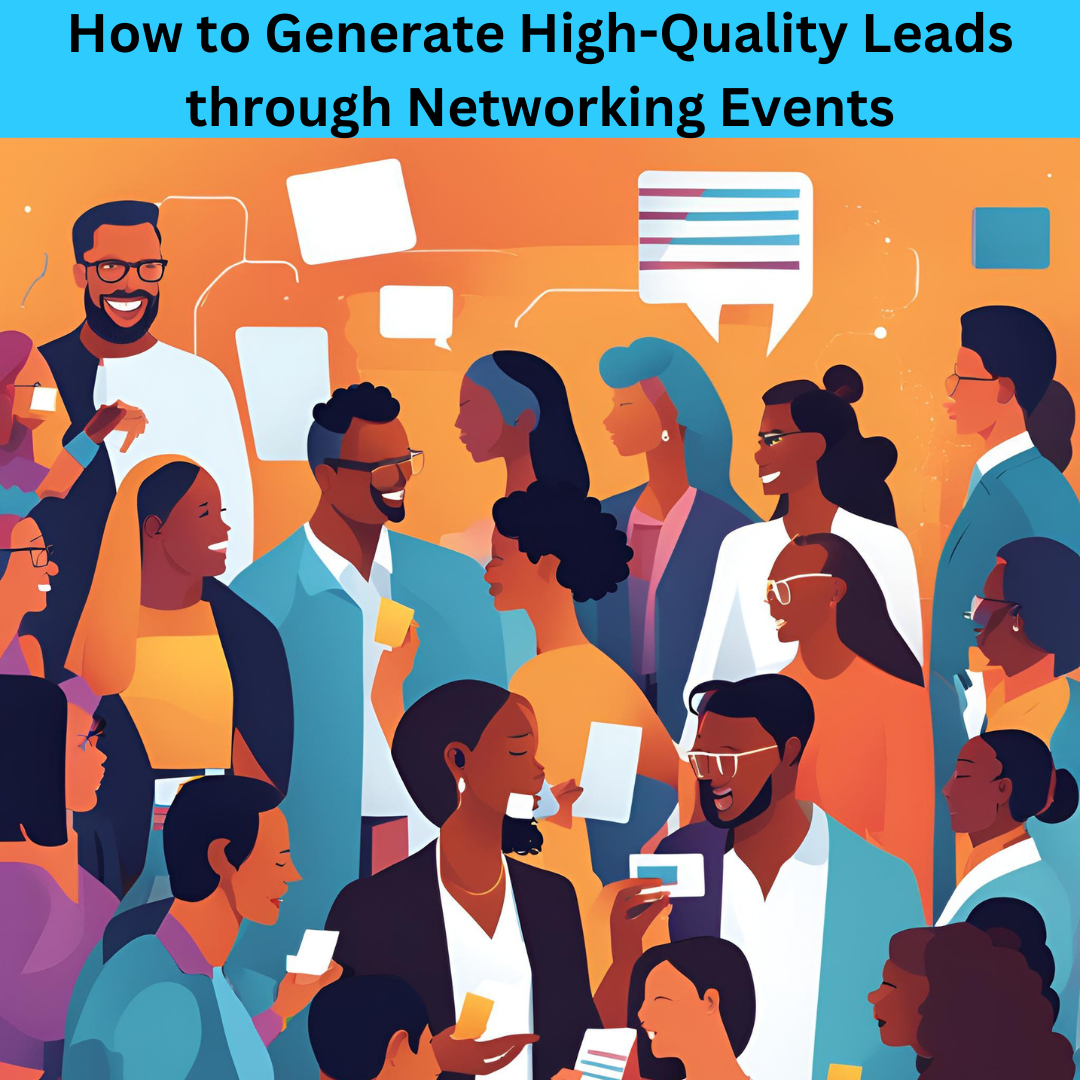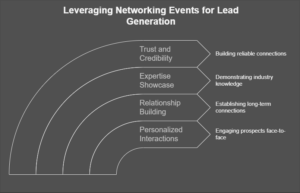
Networking events are a great opportunity to connect with like-minded people, potential clients, and partners. Whether in-person or virtual, these events are powerful platforms for generating high-quality leads. They allow businesses to engage with prospects in a more personalized manner, build relationships, and showcase their expertise in a specific field. Unlike digital marketing, where interactions are often impersonal, networking events offer a face-to-face or real-time interaction that builds trust and credibility.
This means that attending networking events should be strategically planned, prepared for, and approached with a clear agenda. It’s not just about showing up, but also engaging effectively with other participants, sharing value, and positioning your brand as a solution to their needs. Here’s how businesses can leverage networking events to create meaningful connections and generate high-quality leads that convert into long-term clients.
Setting the Right Objectives for Networking Events
The first move to generate quality leads using networking events is to define clear and achievable objectives. Without a defined purpose, it becomes difficult to measure success. Start by asking yourself what you want to achieve from the event. Are you looking for new clients, strategic partners, industry insights, or a combination of these?
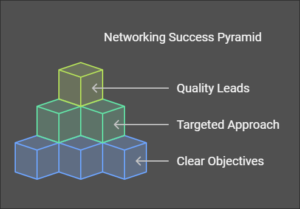
For instance, if you want to generate leads, you would focus on identifying decision-makers and those who have a real need for your product or service. If you are looking for partnerships, you would focus on people who could help you expand your reach or complement your offerings. By setting specific objectives, you can tailor your approach to ensure you are meeting the right people and fostering relationships that will yield high-quality leads.
Clear objectives also direct your interactions at the event. For instance, if you want to generate leads, you can prepare an elevator pitch or materials that will effectively communicate your value proposition. Setting goals ensures that you are always prepared and makes networking a more targeted, fruitful effort.
Preparing an Effective Elevator Pitch
The most important aspect of the leads generated at networking is the elevator pitch. A concise and engaging introduction by yourself, your business, and the value you offer would suffice for an elevator pitch. Your pitch should take less than 30-60 seconds and should talk directly about a specific pain area of your audience.
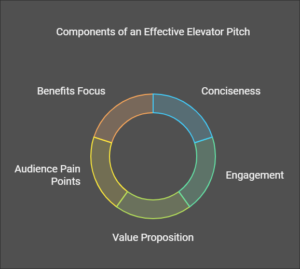
In preparing your pitch, always keep in mind that benefits will talk more than the features of your product or service. Instead of saying, “We offer digital marketing services,” you say, “We help businesses generate more leads and drive sales through targeted digital marketing strategies.” Now, you have an audience immediately interested in hearing what you have to say, as you position yourself as a solution.
Also, tailor your pitch to your audience. Talk more about how your product or service will make them easy. If you are connecting to partners or collaborators, communicate what you share in mutual goals and synergies. Elevator pitches are always going to be a valuable thing in getting attention while garnering high-quality leads.
Relationship-building tactics
Network marketing does not merely mean handing over business cards; it rather means the building of sincere relationships, which leads to sustained success. One of the top ways of generating quality leads is by focusing on building relationship marketing strategies. Listen actively to others and develop a real interest in people’s needs and challenges so that people are more interested in you if they believe you understand and value their needs.
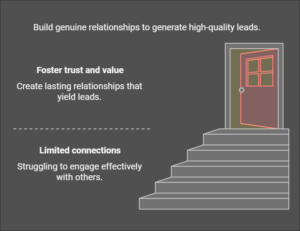
One powerful way of creating relationship building is by offering something for free, hoping nothing comes back in return. Share insights or resources which have nothing to do with your business, but it may benefit others. It will give you the image of really wanting to help and bring value to the conversation, and over time, they will start trusting you which may lead to high-quality leads.
Networking events also provide an opportunity to follow up with people after the event. Send a personalized message referencing your conversation and offering to connect further. Building relationships isn’t something that happens overnight, but by consistently engaging and providing value, you’ll turn those connections into valuable leads.
Qualifying Leads During Networking Events
The networking events offer the best chance to qualify leads in real-time. While you interact with other attendees, ask questions that will help you understand their needs, challenges, and goals. Instead of talking about your product or service, listen and find out whether the prospect can benefit from what you are offering.
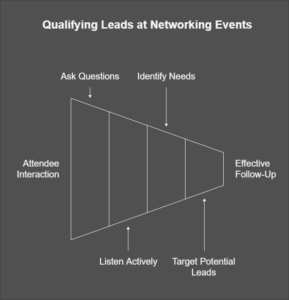
For instance, you can ask questions such as, “What are some of the current challenges your business is facing?” or “What are some of the solutions you are seeking?” Such questions help you determine if your product or service is relevant to the lead’s pain points. Qualifying leads at the event ensures that you can target those with the highest potential and then reach out to them after the event, which makes your follow-up after the event much more effective and efficient.
Additionally, use your instincts and experience to measure interest. If a person appears actually interested and asks questions involving specifics about your offerings, you are probably dealing with a lead of high quality. Then again, do not look to jump into selling as yet. Instead, nourish the relationship and guarantee that the solution you can provide is one that adequately addresses their needs.
Social Media for Engagements Pre-Event and Post-Event
Social media can also play a significant role in both pre-event and post-event lead generation. Researching attendees and engaging with them before attending a networking event using social platforms such as LinkedIn or Twitter is helpful. If you know certain prospects will be at the event, reach out to them beforehand and start a conversation. You can join event-related hashtags or groups to connect with attendees before the event.

Share your experiences and insights about the event on social media, tagging other attendees or the event organizers. That way, you increase your visibility and also show that you’re an active participant, thereby strengthening your professional relationships even more. Social media is a powerful tool for creating pre-event buzz and keeping your leads engaged long after the event has ended.
After the event, follow up with leads by connecting with them on LinkedIn or via other social media channels. Share relevant content, continue the conversation, and offer valuable resources. Engaging on social media keeps you top-of-mind for leads and creates opportunities for further interaction.
The Importance of Follow-Up After Networking Events
Arguably, the most crucial follow-up is in the process of lead generation in networking events. Right after the event, make sure to follow up with all the quality contacts you made. Tailor your follow-up message so that it would specifically reference the details of your conversation as proof that you remember and care about the connection. A generic mass email will hardly make a dent.
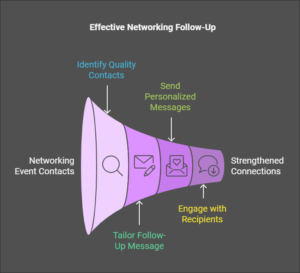
The follow-up message should serve as a continuation of your initial conversation, where you can provide additional value. For example, offer a resource, such as a blog post, case study, or product demo, that aligns with the prospect’s needs. Keep the message brief and professional, while also making it clear how you can help them with their challenges.
If the lead is interested, organize a further conversation or meeting to discuss possible partnerships. Persistence is important, but not too pushy should be the case in the process of follow-up. Target creates a relationship over time as quality leads are expected to convert when nurtured effectively.
Nurture Leads from Networking Events
While creating high-quality leads at networking events is just half the step, nurturing such leads into long-term clients or partners requires a lot of care. Lead nurturing is therefore maintaining regular, meaningful communications that will build trust with your business as the perfect solution to their needs.
![]()
Begin with personalized content that speaks directly to the lead’s challenges or interests. Whether it is an email with tailored information or an invitation to an exclusive webinar, providing valuable content keeps leads engaged. Check in regularly with leads to maintain a connection, but be careful not to overwhelm them with too much communication. Quality is more important than quantity.
Another area for nurturing is listening to lead feedback and adjusting your messaging or offerings based on lead’s changing needs. In due course, as trust grows, leads are more likely to become loyal customers or good business partnerships.
How to Measure the Effectiveness of Lead Generation in Networking Events
Measuring the success of lead generation from networking events is very important to determine how effective your efforts are. One of the first metrics to track is the number of leads generated. However, this is just the beginning. Focus on tracking the quality of those leads by assessing their engagement and likelihood to convert into customers.

Another important metric is the conversion rate of leads, which measures the number of leads from the networking events that eventually go on to buy or take a desired action. You can measure the success of follow-up efforts as well by the number of leads who have engaged with your post-event communication and are interested in your offerings.
Lastly, think about the long-term value of connections made at the event. Even if a lead doesn’t convert right away, future potential as a repeat client or referral source should be part of the success measurement. These metrics help you tailor your strategy for future events, making your lead generation approach better with each networking opportunity.
Conclusion
Networking events create the perfect opportunities for the business to acquire high-value leads, forge relationships, and demonstrate its value in an informal setting. With clear goals, meaningful conversation, and following up on prospects, you can have lasting contacts that translate to future opportunities for business.
The key to successful lead generation at networking events is understanding that these events are about relationship-building, not just selling. By nurturing leads, utilizing social media for engagement, and measuring your efforts, you can maximize the return on your networking investments and generate high-quality leads that contribute to long-term success.
